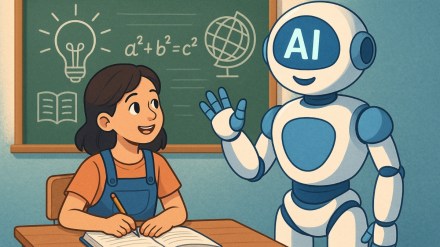Once a flashy tech term, Artificial Intelligence (AI) is now rewriting the rules of Indian education. AI is everywhere, from grading papers, tutoring students and even in predicting who might fail. But beneath the hype lies a bigger question – is AI building smarter learners or just faster test-takers?
According to a 2025 report by NITI Aayog, more than 60% of Indian schools now use AI-powered learning tools, a jaw-dropping leap that’s making personalised education more than just a dream. But experts warn, this revolution could backfire if we don’t use AI wisely.
Why students must learn with tech, not from it
“Although AI is changing the tools we use, it’s not obviating the core skills students need to thrive beyond schooling. Our students learn the ability to question assumptions, navigate complexity and apply judgment, because these skills are deeply embedded in our curriculum. In this context, we see AI as a tool to enhance learning, not as a replacement,” Vinay Sharma, Senior Vice President, International Education, Cambridge University Press & Assessment, South Asia.
Real-world learning, not just AI reliance
AI is automating basic tasks, but the future belongs to those who can use AI as a creative partner. “At Scaler, we equip learners to not merely utilise AI tools, but to lead effectively with them. Integrating optimal tools with expert training, we enable learners to excel in an AI-driven landscape,” explains Abhimanyu Saxena, Co-Founder of Scaler.
AI-powered platforms are already making waves in India. Tools from Byju’s, Vedantu and PhysicsWallah use AI to analyse students’ strengths and weaknesses, tailoring content and pace to each learner’s needs. Adaptive assessments and intelligent tutoring systems provide targeted feedback, helping students take ownership of their education and boosting confidence.
Scaler’s project-based curriculum is designed to “ensure AI serves as a cognitive tool, augmenting rather than replacing their critical thinking abilities. We challenge learners by immersing them in live projects and case studies that mirror real-world challenges. By working on actual problems with tangible users and constraints, students develop a deeper, holistic understanding.”
Bridging the digital divide – The equity challenge
Here’s the dark side no one talks about: what if AI only helps the privileged? While AI can personalise learning and even break language barriers but the digital divide remains a major hurdle. Many startups and educators warn that students in tier-2 and tier-3 cities or those lacking digital access, could be left behind. The challenge is ensuring that AI-driven education reaches every classroom, not just those in urban or elite institutions.
“For AI to truly democratise education, addressing the digital divide is crucial. To ensure everyone benefits from AI, collaboration among society, businesses and governments is essential for establishing clear ethical guidelines for its development and use. All of us have a role to play in bridging this gap,” emphasises Chaitali Moitra, Regional Director, South Asia, Turnitin.
Recent studies by the Brookings Institution show that students in tier-2 and tier-3 cities are 40% less likely to have access to AI-powered learning tools than their urban counterparts. Closing this gap is now a top priority for policymakers and ed-tech firms alike.
Innovation hubs and industry partnerships
What’s really happening behind the scenes? Elite institutions like IITs are turning into AI startup factories, incubating breakthroughs that could change how the world learns.
India’s top institutions are evolving into launchpads for AI-driven innovation. “Institutes like IIT Madras have incubated multiple deep-tech startups. We’re also seeing research and curriculum evolve, like IIT Hyderabad’s B.Tech in AI and IIT Delhi’s applied AI labs, which embed industry use cases directly into student learning,” notes Vineet Govil, CTPO, PhysicsWallah.
AI can’t replace this one thing
As India leaps into the AI era, a quiet revolution is happening in leadership. “India’s AI surge is not just about adopting new technologies, but about reimagining how we work, learn and innovate,” says Rajiv Jayaraman, Founder & CEO of KNOLSKAPE. “The real differentiator will be leaders who can balance the power of intelligent machines with a deep commitment to human-centric values.” His company’s 2025 survey shows a stunning shift: half of Indian leaders now prioritise human values when implementing AI.
The bottom line
AI is here to stay and it’s transforming how we learn, work and lead. But the real winners of India’s AI revolution won’t be those with the flashiest gadgets. They’ll be the ones who think deeply, question everything and stay human in a machine-made world.
So the question is: Will you master AI or will AI master you?
